They made a joyful noise all right – unto the Lord and unto the nearly 3,000 other excited people in the room at roll call for the opening plenary session for the 13th National Black Catholic Congress.
When their name was called, the 115 member strong delegation from the Archdiocese of Philadelphia let everyone know that Philly was in the house, along with 80 other jubilant diocesan groups that had waited six years for this moment.
The Congress, normally a quinquennial event, had to wait an additional year to COVID and had not met since 2017 in Orlando. Now it was July 2023 in Oxon Hill, Maryland, just outside of Washington, DC.
This vast “family reunion” of American Black Catholics and those who serve with them was ready to offer praise and thanksgiving; to catch up with old and new brothers and sisters; and, above all, to do the hard work of discerning God’s vision to take them into the future with strength, passion, love, and solidarity.
Writing the Vision
The theme for Congress XIII was “Write the Vision: A Prophetic Call to Thrive,” drawn from Habakkuk 2:2-4:
“Then the Lord answered me and said: ‘Write down the vision; make it plain upon tablets, so that the one who reads it may run. For the vision is a witness for the appointed time, a testimony to the end; it will not disappoint. If it delays, wait for it, it will surely come, it will not be late. See, the rash have no integrity, but the just one who is righteous because of faith shall live.’”
The Congress was the largest by far since journalist and civil-rights activist Daniel Rudd convened the first “Colored Catholic Congress” in January 1889, when 200 delegates met with President Grover Cleveland. The celebrant at that first Congress Mass was none other than the Venerable Fr. Augustus Tolton, widely recognized as the first Black Roman Catholic priest in the U.S. and now a candidate for sainthood.
Knowing and Growing
This year, more than 2,600 attendees and delegates packed some 60 breakout sessions on a broad range of topics, including Black Catholic Spirituality, Afrocentric Catechesis, mental and physical health, gentrification, technology, the role of the Black Catholic laity, disability, charisms, and evangelization across cultures, racial justice and the Catholic Church’s own racial divisions.
The United States has about three million Black Catholics today, three-quarters of whom attend Churches where they are in the minority, noted author and presenter Daryl Grisby.
“Black Catholics are uniquely poised to bridge racial divides, for they – and no other race – worship predominantly in spaces where they are not in the majority,” Mr. Grigbsy told a session on “Synodality, Black Catholic Spirituality and the Racial Divide.”
Diversity and Unity
A handful of white clergy, religious sisters and laypeople also participated in these sessions and in the Congress, as did several hundred Black youth and young adults. Cardinal-designate Christophe Pierre, Apostolic Nuncio to the United States, was also present to convey greetings from Pope Francis.
The host Archdiocese was Washington D.C., led by Wilton Cardinal Gregory, the nation’s first Black Cardinal. Cardinal Gregory, a beloved and revered leader, addressed the gathering formally and informally, in a keynote address on the Eucharist and in an informal sit-down with his chief communications officer, Paula Gwynn Grant.
The Cardinal was also the principal celebrant at Mass at the Basilica of the National Shrine of the Immaculate Conception, a standing-room-only liturgy of passion and pageantry that stoked the fires of faith and purpose among all present.
Also prominent was Philadelphia’s own Fr. Stephen D. Thorne, Ed.D., who leads Archbishop Nelson Pérez’s Commission on Racial Healing. Fr. Thorne, now the Pastor at St. Barbara Parish in Wynnefield, has been a longtime consultant to the Congress and reminded the attendees that their vision and path must always be built on encounter, formation, and action.
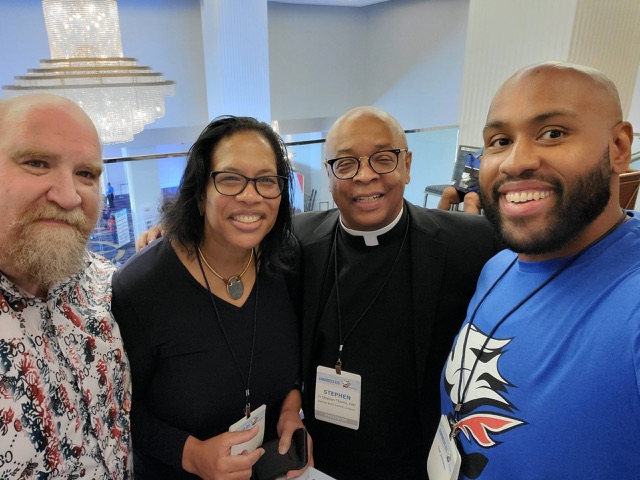
Fr. Stephen D. Thorne (center) pictured with delegates from the Archdiocese of Philadelphia. (Photo courtesy of the archdiocesan Office for Black Catholics.)
Other highlights included an electrifying motivational address by Dr. Omékongo Dibinga and a service project in which attendees packed 75,000 meals for No Child Hungry.
Drawing Together
An event so large, so complex, and so anticipated is a challenge indeed to mount, and the result could have felt fragmented or even chaotic. But the Holy Spirit tied it all together with two powerful threads.
The first was the music of the Congress Choir, with more than 150 voices under the direction of Lynne’ Gray, of the Archdiocese of Washington. In liturgies, at Morning Praise & Prayer and elsewhere, the music transcended the multitudes of conversations and agendas, keeping 3,000 voices united, joyful and focused on God. Planning for the Congress music begins years ahead of time, and rehearsals consume countless hours, prior to and throughout the Congress.
The second constant was the palpable presence of Venerable Pierre Toussaint, Venerable Henriette Delille, Venerable Father Augustus Tolton, Venerable Mother Mary Lange, Servant of God Julia Greeley and Servant of God Sister Thea Bowman.
Their larger-than-life images watched over the crowd from the main stage/altar throughout the Congress. Students from Saint Francis Xavier Catholic Academy, Washington D.C., spoke of each one’s trials, their courage, their example and their legacy. These scholars were honored to bring to life these outstanding people in a play called “Daniel Rudd and the Sacred Six,” written by Sister Lynn Marie Ralph, SBS.
More cherished elders than distant historical figures, these six, along with Daniel Rudd and the millions of Black Catholic forebears whose names are not so well known, will be both the witnesses and beacons for the vision that this 13th Congress will write.
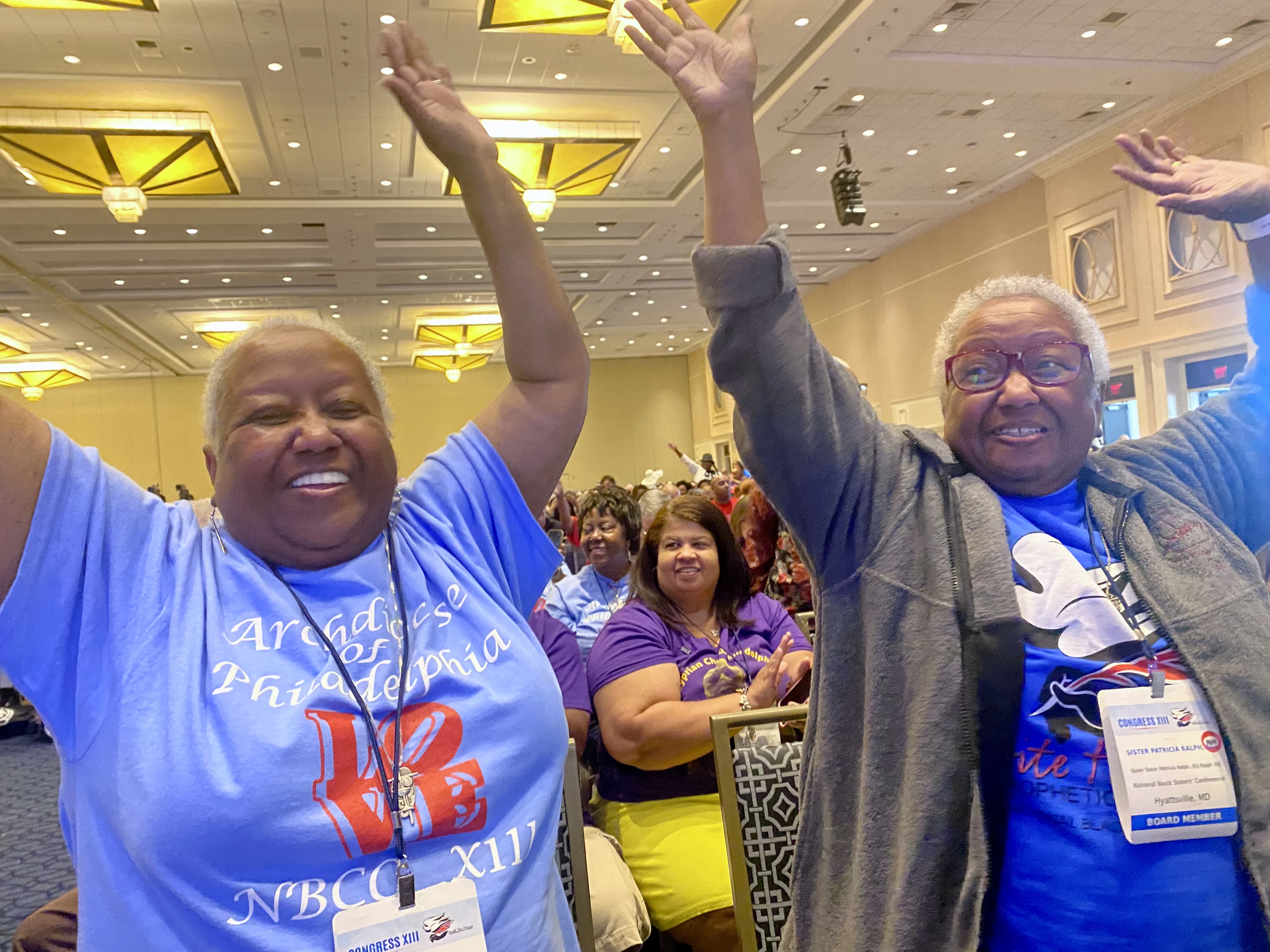
Sister Lynn Marie Ralph, SBS and Sister Patricia Ralph, SSJ attend the National Black Catholic Congress as delegates from the Archdiocese of Philadelphia.

Left to right: Marc, Tonya, Doug, and Mary attend the National Black Catholic Congress as delegates from the Archdiocese of Philadelphia.
PREVIOUS: Delaware County Parish Honors Mary with Triduum of Prayer For Feast Day
NEXT: MagniFest Returns for Third Year of Musical Praise in Chester County



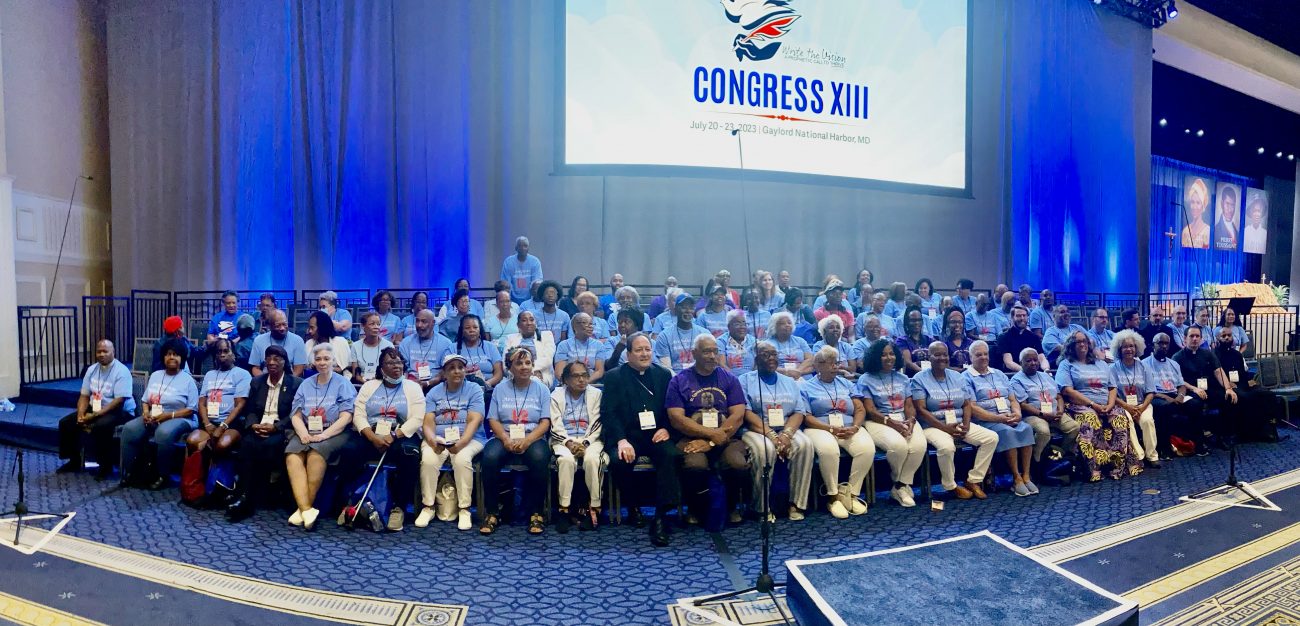
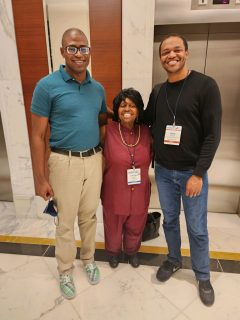
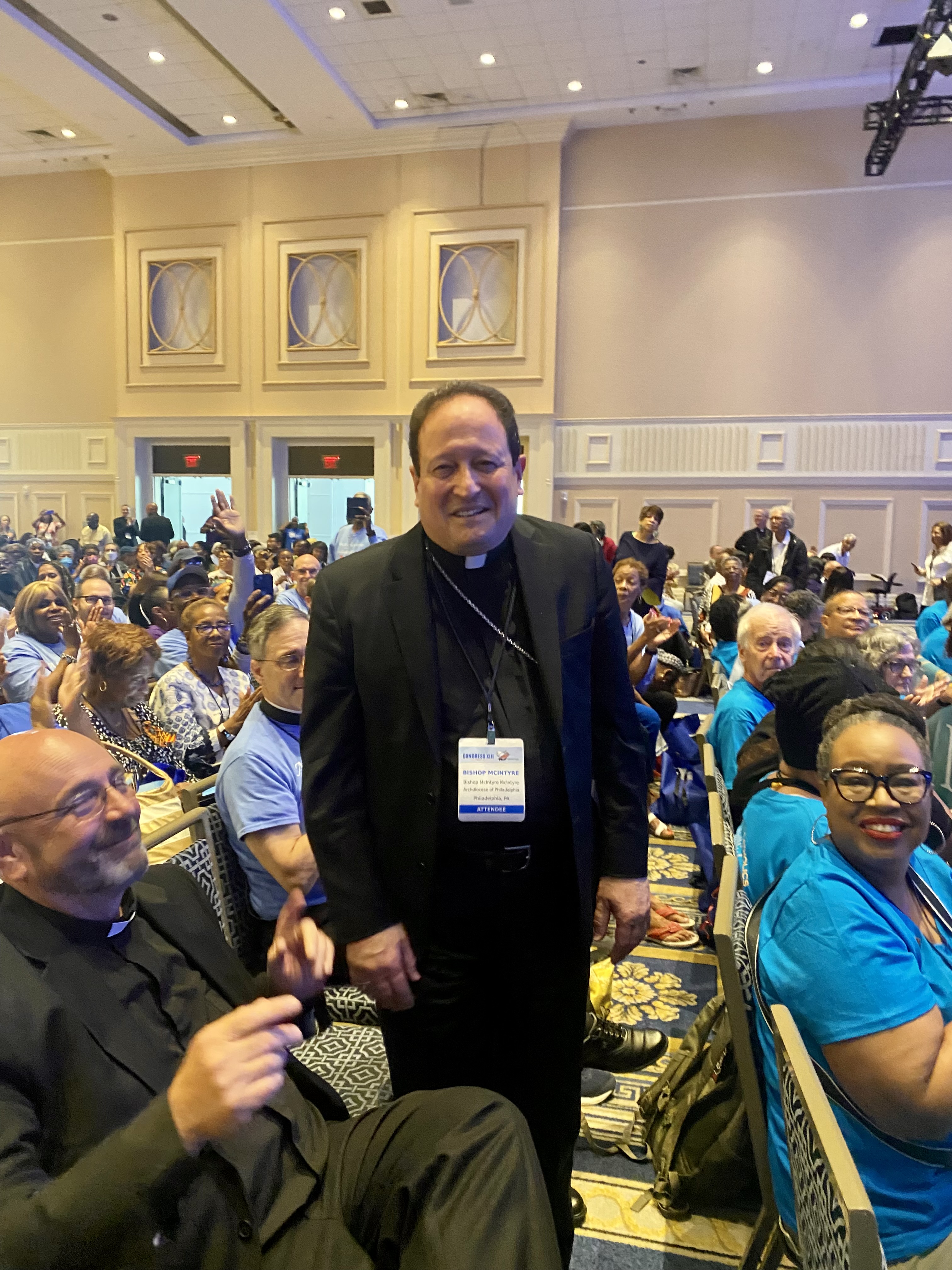
Share this story